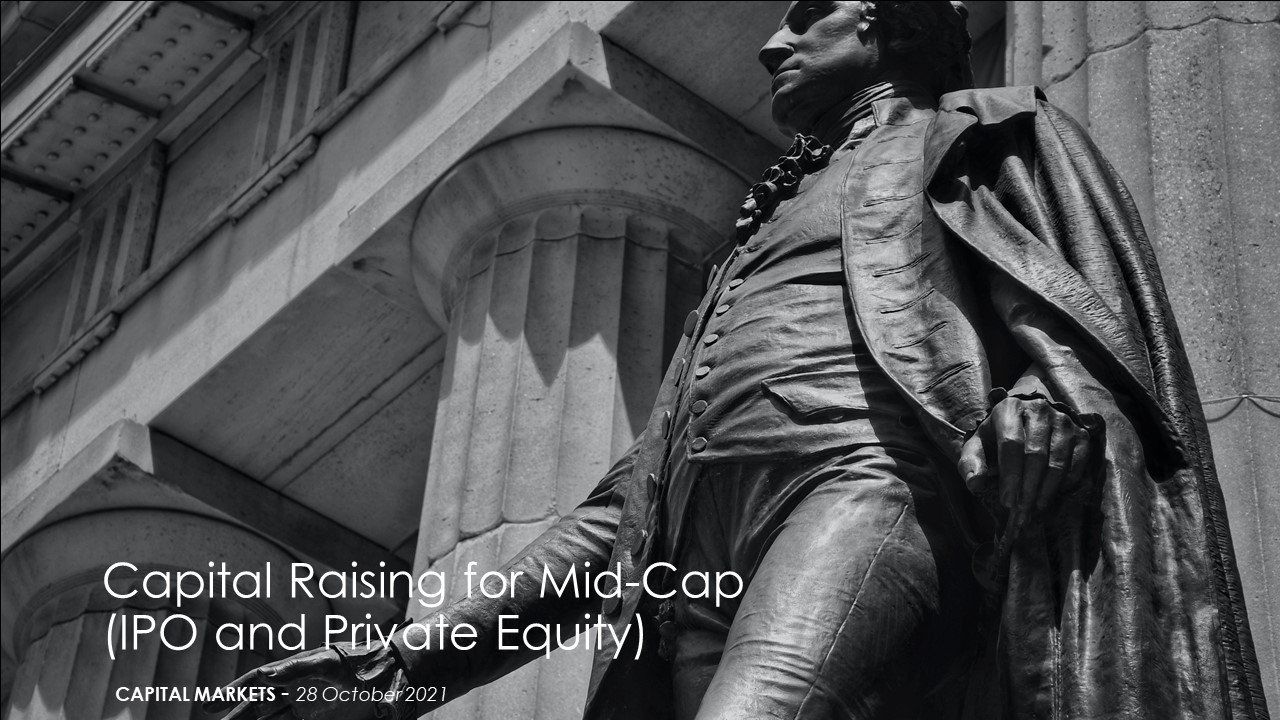EU businesses showed great success in raising capital via IPO and private equity financing despite the
slowed-down growth projected during the Coronavirus pandemic. In Europe, the value of private equity funds raised in 2020 was EUR 101 billion, and while the value of funds raised through European IPO activities decreased by 56%, it wasn't as bad as the UK IPO activities, for example.
Therefore, it is safe to assume that there is no liquidity shortage for European businesses. The entrepreneurs just need the basic knowledge and the right technical expertise.
Mid Cap
With a total market capitalization between EUR 500 million to EUR 10 billion midcap firms are one of the three major stock classifications, and they provide a middle ground between the growth, risk, and volatility tradeoffs of their smaller and larger counterparts.
Mid-cap businesses usually enjoy a positive interest from institutional, public, and private investors. After all, they are in the middle of their growth curve, with revenues, profits, and prospects poised to grow multifold in a short period.
Mid-cap companies haven't quite made it to large-cap status, but they have a longer track record of success than small-cap companies. These companies typically have a well-established business model and a strong presence in their respective industry, and they may see rapid growth as they increase market share. They are frequently the focus of mergers and acquisitions by large-cap corporations. Mid-cap corporations, on the other hand, include once large-cap companies that have shrunk in size and power.
How Does Market Capitalization Work?
An essential part of raising capital is to value the company. Both index providers and portfolio managers use market cap data to decide on benchmarks and investment strategy respectively.
Market capitalization, often known as market cap, is a formula to calculate a company's stock market worth. The market capitalization of a corporation is equal to the stock price multiplied by the number of outstanding shares. A corporation with 100 outstanding shares, each worth $100, would have a market valuation of $10,000 (100 shares x $100).
Raising capital to enable growth
A mid-cap firm may be enticing to investors since it is predicted to grow and increase in earnings, market dominance, and profitability; it is in the midpoint of its growth curve.
One of the primary motivations for a private firm to raise capital is for financial reasons. Raising capital provides the company with access to cash, typically in substantial amounts. This money infusion might be used to pay down debt, fund new enterprises or expand research and development (R&D). It also enables businesses to strengthen their balance sheets and secure future financing.
However, two key factors can make or break the capital raising efforts of a mid-cap business.
These are:
- Reasons for capital raising: There can be many reasons for a mid-cap business to raise capital - geographic expansion, getting ahead of competitions, new facilities, and such. Irrespective of whatever it might be, it needs to be compelling enough to satisfy regulators and the investors.
- Communicating the equity stories: Next, the reasons and the plans need to be explained and communicated precisely to the prospective investors. Effective communication is crucial; otherwise, investors won’t know a brilliant venture's unique stories and offerings.
IPO or Private Equity
Companies choose to go through the IPO process or remain private for a variety of reasons, including raising capital or reducing expenses while saving time.
An initial public offering (IPO) is the procedure by which a private firm sells shares to investors on a stock exchange. This gives the general public ownership of the corporation. IPOs provide companies with access to finance, whereas remaining private allows companies to function without having to report to equity investors. Going public can be much more expensive and difficult, while remaining private inhibits a company's liquidity. However, private companies must typically have been through a phase of growth and prosperity before deciding to go public via an IPO.
If a corporation decides to stay private, ownership is retained by private owners, albeit stock can be issued to shareholders. Rather than needing to satisfy Wall Street's expectations, staying private allows a company more discretion to choose its investors and maintain its focus or strategy. And, because going public entails a risk, the benefit of being private is that it protects the company from that risk.
Finally, whether it’s an IPO or private equity financing, businesses need strong industry expertise and the proper network channels to raise capital successfully. As the money also needs to come from the right investors, getting the help of a specialized partner in the sector can prove to be hugely beneficial.
Valida’s team of professionals and experts with solid international track-record and know-how in diverse sectors can cover all strategic and financial needs of our clients.
i. Source: Statista
Valida welcomes Gianluca Perini, new Associate Partner. Expertise in corporate finance, M&A and strategy supporting businesses.





